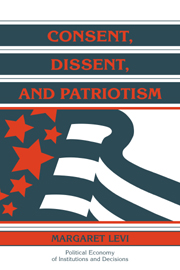Book contents
- Frontmatter
- Contents
- Series editors' preface
- Acknowledgments
- 1 HISTORY AS POLITICS
- 2 THE CONTINGENCIES OF CONSENT
- 3 GONE FOR A SOLDIER
- 4 THE PRICE OF CITIZENSHIP
- 5 THE INSTITUTION OF CONSCRIPTION
- 6 GIVING AND REFUSING CONSENT: CITIZEN RESPONSE IN THE CANADIAN CONSCRIPTION CRISES
- 7 A WEAPON AGAINST WAR: CONSCIENTIOUS OBJECTION IN THE UNITED STATES, AUSTRALIA, AND FRANCE
- 8 THE DEMOCRATIZATION OF COMPLIANCE
- Bibliography
- Index
- Titles in the series
8 - THE DEMOCRATIZATION OF COMPLIANCE
Published online by Cambridge University Press: 10 December 2009
- Frontmatter
- Contents
- Series editors' preface
- Acknowledgments
- 1 HISTORY AS POLITICS
- 2 THE CONTINGENCIES OF CONSENT
- 3 GONE FOR A SOLDIER
- 4 THE PRICE OF CITIZENSHIP
- 5 THE INSTITUTION OF CONSCRIPTION
- 6 GIVING AND REFUSING CONSENT: CITIZEN RESPONSE IN THE CANADIAN CONSCRIPTION CRISES
- 7 A WEAPON AGAINST WAR: CONSCIENTIOUS OBJECTION IN THE UNITED STATES, AUSTRALIA, AND FRANCE
- 8 THE DEMOCRATIZATION OF COMPLIANCE
- Bibliography
- Index
- Titles in the series
Summary
… science started and ended in observation, and theory should always be endangered by it.
Norman Maclean (Young Men and Fire: 137)All history is written backwards. … We choose a significant event and examine its causes and its consequences, but who decides whether the event is significant? We do, and we are here; and it and time, they are in our hands. … We make them fight their battles over again for our edification and pleasure, who fought them once for entirely other reasons.
Margaret Atwood (The Robber Bride: 123)Governance by consent is extremely demanding of both governments and their citizens, but it is less costly and less dangerous than governance by coercion. While there is a strong coercive element to all governments, whatever the regime form, democracy's maintenance requires, as well, a significant degree of voluntary and active compliance. This is not the once-and-forever consent to a social contract that Hobbes elaborated, nor is it the generational and large-scale contract renewal of Locke. It is, instead, the felt and activated obligation to cooperate with the demands of government in those domains that are constitutive of citizenship and citizenship rights.
These are among the lessons of the historical events and struggles recounted here. The model of contingent consent has been endangered by observations and alternative explanations. It survives the test of plausibility and sheds considerable light on compliance and consent in democracies.
- Type
- Chapter
- Information
- Consent, Dissent, and Patriotism , pp. 200 - 219Publisher: Cambridge University PressPrint publication year: 1997



